仁爱版七年级下册英语知识总结
(完整版)仁爱版英语七年级下全部知识点总结.doc

七年级下英语知识点总结Unit 5 Topic1㈠短语总结1.在学校大门口 at the school gate2.来学校come to school3. 去学校go to school4. 上课have class / have classes5. 步行on foot6.骑自行车ride a bike/ ride bikes/ by bike / on a bike7.坐公交by bus / take a bus8.坐地铁by subway / take the subway / on the subway9.坐飞机by plane/ take the plane / on the plane10.坐小汽车by car / in a car/ take a car/ drive a car11. 坐轮船by ship12. 坐小船by boat13. 坐火车by train / on the train14. 在我们组in our group15.一群学生a group of students16.我们中的三个人 three of us17.在平日 on weekdays18.在周末 on the weekends / at weekends19.起床 get up20.睡觉 go to bed21.早起 get up early22.回家 go home23.到家 get home24.去动物园 go to the zoo25.去公园 go to the park26.看电影 see a movie / film27.看电视 watch TV28.在晚上 in the evening / at night29.帮助父母 help parents30.做某人的家庭作业 do one’s ( my/ her/ his/ your/ their)homework31.在学校 at school32.知道 ,了解 know about / learn about33.校园生活 school life34.一个美国学生 an American student35.在美国 in America / in the U.S.A.36.许多学生 many students/ a lot of students/ lots of students37.很少 very few38.吃午饭 have lunch39.出去吃饭 eat out40.在校期 on school days41.休息一会 have a short rest/ break42.午后 after lunch43.在某人的余 in one’s ( my/ his/ her/ their⋯)free/ spare time44.打球 play basketball45.踢足球 play soccer / football46.琴 play the piano47.吉他 play the guitar48.拉二胡 play erhu49.去游泳 go swimming / go for a swim50.去划船 go boating51.球 a ball game / ball games52.一年四次 four times a year53.听音 listen to music54.read books55.看 read newspapers56.看医生 see a doctor57.去 go to the library58.一周两次 twice a week59.朋友 meet friends60.每天 every day61.在七点半 at half past seven62.一小会 for a little while / for a short time63.晚后 after supper64.吃 have dinner65.吃早 have breakfast㈡重要句型1.I usually come to school by subway.同句 : I usually take the subway to school.划部分提 : How do you usually come to school?似的有:go to school by bike=go to schoolon a bike= ride a bike to school=ride to schoolgo home by bus=go home on a bus=take a bus home2.How do you usually/ often⋯?你通常 /常怎⋯?3.It ’stime for class.=It’s time to have class. =It’s time for having class.4.What about you? =How about you?5.How often ⋯? 率,回答可以用率副: always, usually, often,sometimes, seldom, never, every day ,every +其他名或表示率的短回答表示率的短:次数 +位e.g. : once a day / twice a week / three times a month6.The early bird catches the work. ( ) 笨先7.Work / Study must come first. 工作 / 学必放在第一位!8. Classes begin at eight. =Class begins at eight.提问:What time does the class begin? / What time do the classes begin?㈢重要单词的用法1.look (感官动词 ) 看起来,后面加形容词His mother looks very young.They look very cute.Her dress looks very nice.You look very cool in this coat.2. by 介词by 后面直接加表示交通工具的名词,中间不用任何词修饰,如: by bike by +动词 ing 形式,表示通过某种方式People show love to their mothers by giving cards.You can be a good student by working hard.3.over (形容词 ) School/ Class is over.4.begin现在分词 : beginning 过去式 : beganbegin to do sth , begin doing sthHe begins to write a letter. =He begins writing a letter.如果 begin 本身为分词,只能用begin to do sthHe is beginning to run.5.listen to 听(动作), hear 听见 (结果 )6.always 反义词 never7.本话题涉及的时态为一般现在时,句中常有频率副词或表示频率的短语,如果主语为三单,动词一定要用三单!(四)易错题1.You new watch ______ (look) very nice!2.Here ______(be) some news.3.Oh, come on! It’s time_____ going to school.4.They usually go to school on ________(feet).5.In my class, forty of _______(we) go to school by bike.6.The early bird ______ (catch) the worm.7.Kangkang often _____ (ride) a bike to the park.8.What time _____ (be)school over?9.Work must come ______(once).10.It ’stime ____you to get up.11.We often _____ books in the morning.12.Jill ’s friend like ______(study) in our school.13.Mr. Wang teaches ______(we) English. _____ of us like him.14.How about ______(go) out with me?15.Most students go to school _____ the school bus.16._______ do you go shopping with your mother?A. How soonB. How farC. How oftenD. How much17. What time do you usually get up _____ weekdays?18. He ______ busy, so he has no time to play with us.A. is alwaysB. seldom isC. always isD. often is19.The last class______(finish) at twelve o’clock.20.Let’s go______(boat).21.It’stime to have breakfast. 同(义句 )______________________________________________________.22.Michael often rides a bike to school. 同(义句 )______________________________________________________.23.I always go to work on foot. (对划线部分提问 )______________________________________________________.24.My mother goes shopping twice a week. 对(划线部分提问 )______________________________________________________.25.Mary always reads books in the library. 反(义句 )______________________________________________________.26.He usually does his homework at school.否(定句 )______________________________________________________.27.They often go to school by bus in the morning. 对(划线部分提问 ) ______________________________________________________.28.Jane seldom watches TV on weekdays改.(为一般疑问句 )______________________________________________________.29.He usually has lunch at home. 对(划线部分提问 )______________________________________________________.30.Li Ping often goes to work on foot. (同义句 )______________________________________________________.31.几乎没有学生乘地铁去学校。
仁爱英语七年级下册各单元知识点总结归纳Unit7Topic2

Unit7 Topic2 Section A学习目标1.学习can/can't的用法,学会谈论某人能够和不能够做的事情,并进行才艺展示。
2.学习并掌握选择疑问句的用法。
重点短语1.play the piano/guitar 弹钢琴/吉它2.perform ballet 表演芭蕾舞3.dance to disco 跳迪斯科4.at the party 在晚会上5.have a good time=enjoy oneself=have fun 玩得高兴,过得愉快名师课堂1.Do you want to sing Chinese songs or English songs?你想唱中文歌还是英文歌?由or构成的选择疑问句,其结构是一般疑问句或特殊疑问句加选择部分,选择部分用or连接,回答时不用Yes或No,而是直接选择。
e.g.-Do you want to play basketball or soccer?你是想打篮球还是踢足球?-I want to play soccer.我想踢足球。
2.But I can't sing Chinese songs.I can only sing English songs.但是我不会唱中文歌,我只会唱英文歌。
can 是情态动词,不能单独作谓语,只能和动词一起构成谓语,没有人称和数的变化,表示“能,会”之意。
含有can的陈述句变为否定句时,直接在其后加not,缩写为can't.含有ean的陈述句变为疑问句时,只需要把can 提前大写目子母,答语通常为Yes,主语+can./No,主语+can't.,有时也用一些程度的词来回答。
e.g - Can you play the piano?你会弹钢琴吗?-Yes,I can,/No,I can't,是的,我会。
/不,我不会。
(Yes,a little./No,not at all.是的,会一点。
七年级英语仁爱版下册知识点总结topic1.
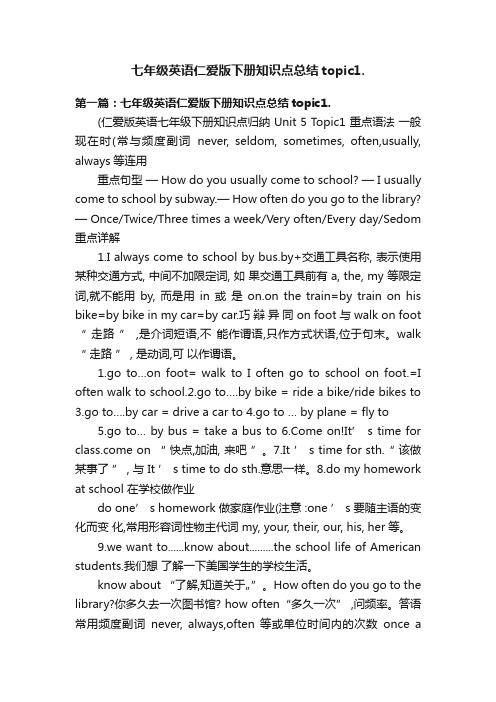
七年级英语仁爱版下册知识点总结topic1.第一篇:七年级英语仁爱版下册知识点总结topic1.(仁爱版英语七年级下册知识点归纳 Unit 5 Topic1 重点语法一般现在时(常与频度副词never, seldom, sometimes, often,usually, always等连用重点句型— How do you usually come to school? — I usually come to school by subway.— How often do you go to the library? — Once/Twice/Three times a week/Very often/Every day/Sedom 重点详解1.I always come to school by bus.by+交通工具名称, 表示使用某种交通方式, 中间不加限定词, 如果交通工具前有 a, the, my 等限定词,就不能用by, 而是用in 或是on.on the train=by train on his bike=by bike in my car=by car.巧辩异同 on foot 与 walk on foot “ 走路” ,是介词短语,不能作谓语,只作方式状语,位于句末。
walk “ 走路” , 是动词,可以作谓语。
1.go to…on foot= walk to I often go to school on foot.=I often walk to s chool.2.go to….by bike = ride a bike/ride bikes to3.go to….by car = drive a car to4.go to … by plane = fly to5.go to… by bus = take a bus toe on!It’ s time for e on “ 快点,加油, 来吧”。
仁爱英语七年级下册unit7知识点

Unit 7 Topic 3 知识点总结一、语法:一般过去式1、概念:表示过去发生的动作、事件、情况,而现在已结束,也可以表示过去时间里经常性或习惯性的动作,或主语过去的性格和能力。
2、常见的时间状语①yesterday ,yesterday morning/afternoon/evening②just now刚才in the past过去the day before yesterday前天③ago短语:a moment ago, an hour ago, three weeks ago, two months ago, four years ago等④in+时间点:in 2000,in 1995,in 1880⑤last短语:last week上周/last year去年/last month上个月/last night昨天晚上二、是三、1、at the party在聚会上2、recite a Chinese poem背汉语诗3、perform magic tricks表演魔术4、enjoy oneself=have a good time玩的愉快5、miss the chair 坐空椅子6、fall down摔倒7、hurt yourself伤了你自己8、at once立刻9、sth happened to sb某事发生在某人身上10、at that time在那时11、come back home回家12、lie to sb向某人撒谎13、tell sb the truth告诉某人真相14、go to the party with sb和某人一起去参加party15、last night昨天晚上16、tell a lie to sb向某人说谎17、make sb angry使某人生气18、lose the game输了比赛19、buy lots of food and drinks for sb为某人买许多食物与饮料20、each of us我们每一个人21、make the card by hand亲手制作卡片22、a big birthday cake with 13 candles带13根蜡烛的大生日蛋糕23、make a silent wish默默地许愿24、blow the candles out in one breath一口气吹灭蜡烛25、it’s your turn轮到你了26、it’s one’s turn to do sth轮到某人做某事27、enjoy doing sth=like doing sth喜欢做某事四、重要句型1、How was Kangkang’s birthday party? It was very nice.康康的生日party怎么样?它很不错。
(完整版)仁爱版七年级英语下册知识点总结
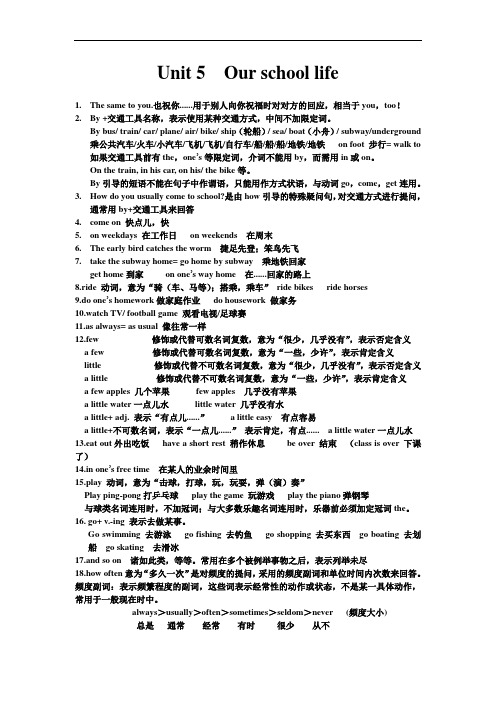
Unit 5 Our school life1.The same to you.也祝你......用于别人向你祝福时对对方的回应,相当于you,too!2.By +交通工具名称,表示使用某种交通方式,中间不加限定词。
By bus/ train/ car/ plane/ air/ bike/ ship(轮船)/ sea/ boat(小舟)/ subway/underground 乘公共汽车/火车/小汽车/飞机/飞机/自行车/船/船/船/地铁/地铁on foot 步行= walk to 如果交通工具前有the,one’s等限定词,介词不能用by,而需用in或on。
On the train, in his car, on his/ the bike等。
By引导的短语不能在句子中作谓语,只能用作方式状语,与动词go,come,get连用。
3.How do you usually come to school?是由how引导的特殊疑问句,对交通方式进行提问,通常用by+交通工具来回答e on 快点儿,快5.on weekdays 在工作日on weekends 在周末6.The early bird catches the worm 捷足先登;笨鸟先飞7.take the subway home= go home by subway 乘地铁回家get home到家on one’s way home 在......回家的路上8.ride 动词,意为“骑(车、马等);搭乘,乘车”ride bikes ride horses9.do one’s homework做家庭作业do housework 做家务10.watch TV/ football game 观看电视/足球赛11.as always= as usual 像往常一样12.few 修饰或代替可数名词复数,意为“很少,几乎没有”,表示否定含义a few 修饰或代替可数名词复数,意为“一些,少许”,表示肯定含义little 修饰或代替不可数名词复数,意为“很少,几乎没有”,表示否定含义a little 修饰或代替不可数名词复数,意为“一些,少许”,表示肯定含义a few apples 几个苹果few apples 几乎没有苹果a little water一点儿水little water 几乎没有水a little+ adj. 表示“有点儿......” a little easy 有点容易a little+不可数名词,表示“一点儿......”表示肯定,有点...... a little water一点儿水13.eat out外出吃饭have a short rest 稍作休息be over 结束(class is over 下课了)14.in one’s free time 在某人的业余时间里15.play 动词,意为“击球,打球,玩,玩耍,弹(演)奏”Play ping-pong打乒乓球play the game 玩游戏play the piano弹钢琴与球类名词连用时,不加冠词;与大多数乐趣名词连用时,乐器前必须加定冠词the。
仁爱英语七年级下册unit8知识点
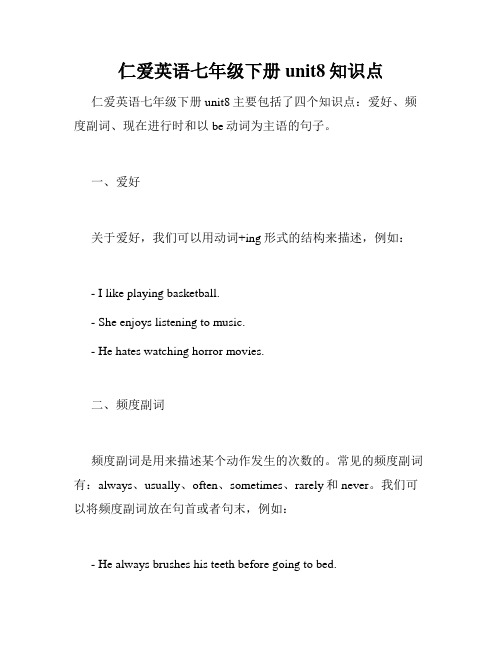
仁爱英语七年级下册unit8知识点仁爱英语七年级下册unit8主要包括了四个知识点:爱好、频度副词、现在进行时和以be动词为主语的句子。
一、爱好关于爱好,我们可以用动词+ing形式的结构来描述,例如:- I like playing basketball.- She enjoys listening to music.- He hates watching horror movies.二、频度副词频度副词是用来描述某个动作发生的次数的。
常见的频度副词有:always、usually、often、sometimes、rarely和never。
我们可以将频度副词放在句首或者句末,例如:- He always brushes his teeth before going to bed.- I usually eat breakfast at 7 o'clock in the morning.- They sometimes go to the park on weekends.- She rarely drinks coffee because it makes her nervous.- We never miss our English class.三、现在进行时现在进行时用来描述正在进行的动作,其结构为:be动词+现在分词。
例如:- He is playing basketball with his friends now.- They are watching TV in the living room.- She is studying English at the library.- We are listening to music in the classroom.需要注意的是,某些动词不宜用于现在进行时,例如感官动词(see、hear、smell、notice、feel、taste)和状态动词(be、seem、appear、look、feel、sound、taste)。
仁爱版英语七年级下册重要知识点和语法点归纳总结
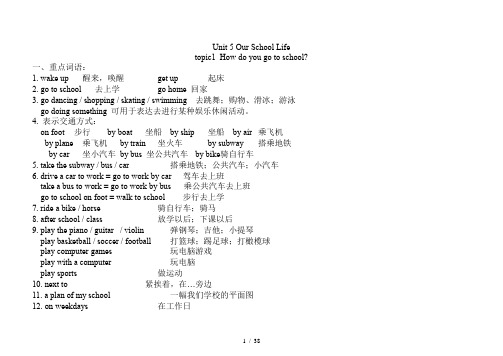
Unit 5 Our School Lifetopic1 How do you go to school?一、重点词语:1. wake up 醒来,唤醒get up 起床2. go to school 去上学go home 回家3. go dancing / shopping / skating / swimming 去跳舞;购物、滑冰;游泳go doing something 可用于表达去进行某种娱乐休闲活动。
4. 表示交通方式:on foot 步行by boat 坐船by ship 坐船by air 乘飞机by plane 乘飞机by train 坐火车by subway 搭乘地铁by car 坐小汽车by bus 坐公共汽车by bike 骑自行车5. take the subway / bus / car 搭乘地铁;公共汽车;小汽车6. drive a car to work = go to work by car 驾车去上班take a bus to work = go to work by bus 乘公共汽车去上班go to school on foot = walk to school 步行去上学7. ride a bike / horse 骑自行车;骑马8. after school / class 放学以后;下课以后9. play the piano / guitar / violin 弹钢琴;吉他;小提琴play basketball / soccer / football 打篮球;踢足球;打橄榄球play computer games 玩电脑游戏play with a computer 玩电脑play sports 做运动10. next to 紧挨着,在…旁边11. a plan of my school 一幅我们学校的平面图12. on weekdays 在工作日at weekends 在周末13. have breakfast / lunch / supper / dinner / meals吃早餐;中餐;晚餐;正餐;一日三餐have classes / lessons / a meeting 上课;上课;开会14. watch TV / movies / games / the animals 看电视;电影;比赛;动物read novels / newspapers / books 看小说;报纸;书15. wash one’s face/ clothes 洗脸;衣服16. 反义词:up – down, early – late 近义词:quickly – fastget up early 早起be late for 迟到17. the first / second / third / fourth day 第一;二;三;四天18. clean the house 打扫房子19. 表示建筑物(尤其学校建筑物):on the playground 在操场at school / home / table 在学校;家里;桌旁in a computer room / teachers’ office / classr oom building / gym / library / lab / canteen在电脑室;教师办公室;教学楼;体操馆;图书馆;实验室;食堂20. around six o’clock = at about six o’clock大约在六点21. 频率副词:never, seldom, sometimes, often, usually, always二、重点句型:1. It’s time to get up.该起床的时候了。
七年级下册英语仁爱版知识点总结
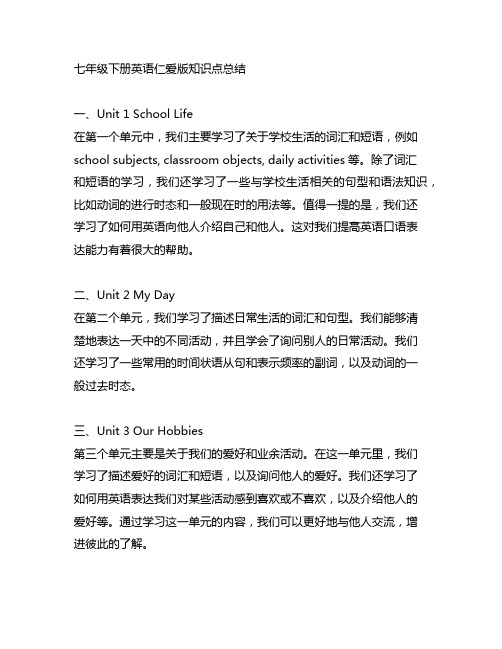
七年级下册英语仁爱版知识点总结一、Unit 1 School Life在第一个单元中,我们主要学习了关于学校生活的词汇和短语,例如school subjects, classroom objects, daily activities等。
除了词汇和短语的学习,我们还学习了一些与学校生活相关的句型和语法知识,比如动词的进行时态和一般现在时的用法等。
值得一提的是,我们还学习了如何用英语向他人介绍自己和他人。
这对我们提高英语口语表达能力有着很大的帮助。
二、Unit 2 My Day在第二个单元,我们学习了描述日常生活的词汇和句型。
我们能够清楚地表达一天中的不同活动,并且学会了询问别人的日常活动。
我们还学习了一些常用的时间状语从句和表示频率的副词,以及动词的一般过去时态。
三、Unit 3 Our Hobbies第三个单元主要是关于我们的爱好和业余活动。
在这一单元里,我们学习了描述爱好的词汇和短语,以及询问他人的爱好。
我们还学习了如何用英语表达我们对某些活动感到喜欢或不喜欢,以及介绍他人的爱好等。
通过学习这一单元的内容,我们可以更好地与他人交流,增进彼此的了解。
四、Unit 4 Celebrations第四个单元主要是关于庆祝活动。
我们学习了描述不同庆祝活动的词汇和短语,以及询问别人关于庆祝活动的相关问题。
我们还学习了一些关于时间的表达方式,比如日期、星期、月份等。
我们还学习了一些关于情感的形容词,以及表示祝福的句型和短语。
五、Unit 5 The World Around Us在第五个单元中,我们学习了描述环境和自然现象的词汇和短语,以及相关的句型和语法知识。
我们可以用英语描述不同的自然现象,比如天气、季节等,也能够表达对自然环境的关心和热爱。
除了这些,我们还学习了一些关于地点和方位的词汇,以及表示允许和禁止的句型和短语。
六、Unit 6 Amazing Stories在第六个单元中,我们学习了一些关于神话故事和传奇人物的词汇和短语。
- 1、下载文档前请自行甄别文档内容的完整性,平台不提供额外的编辑、内容补充、找答案等附加服务。
- 2、"仅部分预览"的文档,不可在线预览部分如存在完整性等问题,可反馈申请退款(可完整预览的文档不适用该条件!)。
- 3、如文档侵犯您的权益,请联系客服反馈,我们会尽快为您处理(人工客服工作时间:9:00-18:30)。
(仁爱版)英语七年级下册知识点归纳Unit 5 Topic1重点语法一般现在时(常与频度副词never, seldom, sometimes, often,usually, always等连用)重点句型—How do you usually come to school?—I usually come to school by subway.—How often do you go to the library?—Once/Twice/Three times a week/Very often/Every day/Sedom重点详解1.I always come to school by bus.by+交通工具名称,表示使用某种交通方式,中间不加限定词,如果交通工具前有a, the, my 等限定词,就不能用by,而是用in 或是on.on the train=by train on his bike=by bike in my car=by car.巧辩异同on foot 与walk on foot “走路”,是介词短语,不能作谓语,只作方式状语,位于句末。
walk “走路”,是动词,可以作谓语。
go to…on foot= walk to I often go to school on foot. =I often walk to school.同样,go to….by bike = ride a bike to go to…. by car = drive a car togo to … by plane = fly to go t o… by bus = take a bus to2 .Come on! It’s time for e on “快点,加油,来吧”。
It’s time for sth. “该做某事了”,与It’s time to do sth.意思一样。
3 .look的短语look the same看起来一样look like看起来像……look for寻找look after 照顾4 .do my homework at school 在学校做作业do one’s homework 做家庭作业(注意:one’s 要随主语的变化而变化,常用形容词性物主代词my, your, their, our, his, her等)。
5 we want to know about the school life of American students. 我们想了解一下美国学生的学校生活。
know about “了解,知道关于…”。
6 巧辩异同 a few与few a few “一些”,few“很少,几乎没有”,修饰可数名词。
a little与little a little“一些”,little“很少,几乎没有”,修饰不可数名词。
7 They often play basketball or soccer, go swimming and so on.go swimming 去游泳and so on “等等”,表示还有很多。
拓展go+v.-ing 表示去做某事,类似的有:go fishing 去钓鱼go shopping 去买东西go boating 去划船go skating 去滑冰8 How often do you go to the library?你多久去一次图书馆?how often“多久一次”,问频率。
答语常用频度副词never, always,often等或单位时间内的次数once a week一周一次twice a month每月两次three times a year每年三次语法讲解一般现在时一般现在时表示:(1)现在所处的状态。
Jane is at school.(2)经常或习惯性的动作。
I often go to school by bus.(3)主语具备的性格和能力。
He likes playing football.(4)客观真理。
The earth goes round the sun.常用的时间状语:often, always, usually, sometimes, every day 等等。
行为动词的一般现在时,助动词是do/don’t和does/doesn’t.当主语是第一、二人称和所有复数形式时,行为动词用原形。
肯定式:I go to school on foot. 否定式:I don’t go to school on foot.疑问式:Do you go to school on foot? —Yes, I do. —No, I don’t.当主语是第三人称单数时,动词用第三人称单数形式,在词尾加-s或-es。
肯定式:He goes to work by bus. 否定式:He doesn’t go to work by bus.疑问式:Does he go to work by bus? —Yes, he does. —No, hedoesn’t.Topic2重点语法现在进行时态。
重点句型What are you doing? He is cleaning the dormitory.Are you doing your homework? Yes, I am./No, I am not.How long can I keep them? Two weeks.重点详解1 at the moment“此刻,现在”,相当于now.2 巧辩异同go to sleep与go to bed①go to bed“上床”“就寝”I often go to bed at ten.②go to sleep“入睡”“睡着”Last night I went to sleep at two o’clock.3 巧辩异同some, a few 与a little“一些,有些”三者都修饰名词。
some既可以修饰可数名词又可以修饰不可数名词。
We want some apples and some water.a few用在可数名词复数之前,a little用在不可数名词之前。
There are a few books and a little waterin the classroom.4 与how相关的短语how often多常how many多少how much多少钱how old多大5 And you must return them on time.你必须按时归还它们。
Return意为“归还,回归”①return sth. to sb.把某物归还某人=give back sth. to sb.②return to“回到…”,相当于come back to…6 Maria and a girl are talking at the lost and found.talk“交谈”,常用的短语talk to/with sb.“与某人交谈”巧辩异同talk, say, speak与tell(1) talk“交谈”,表示通过谈话方式交换意见、消息等。
(2) speak“说话”,强调开口发声,后常接某种语言。
(3) say “说”,强调所说的话的内容。
(4) tell“告诉”,有时兼含“嘱咐”“命令”等。
tell a truth说真话,tell a lie说谎, tell a story 讲故事等固定搭配。
7.I can’t find my purse and I am looking for it. look for“寻找”,强调寻找的过程;find“找到”强调找的结果。
8 .look(at), see与read look(at)指看的动作,see指看的结果,read 常指看书、看报纸等。
9 .Here are some photos of his.这有他的一些照片。
photos of his是双重所有格。
his是名词性物主代词,后还可以接名词所有格。
a friend of mine我的一个朋友 a classmate of my brother’s我弟弟的一个同学10 .I also want to go there one day.我也希望有一天到那儿。
also意为“也”,常用于be动词和情态动词后面,实义动词的前面。
巧辩异同also与too also放在句中,too用于句末。
语法讲解现在进行时1.现在进行时表示:现在正在进行或发生的动作。
2.常用的时间状语:now, at the moment, look, listen等。
3.谓语动词构成:be(am/is/are)+v.-ing形式。
4.现在进行时态的肯定、否定和疑问式。
(1)肯定式:I am running. You are running. He/She is running. (2)否定式:I’m not running.You aren’t r unning. He/She isn’t running.(3)一般疑问句及回答:—Are you running? —Yes, I am./—No, I am not.—Is he/she running? —Yes, he/she is./ —No. he/she isn’t.Topic3重点语法一般现在时和现在进行时的使用和异同。
重点句型What day is ti today? It’s Wednesday.Why do you like it? it’s easy and interesting.What class are they having? They are having a music class. 重点详解1 询问星期几用What day…?回答:It’s Wednesday/Sunday…。
与特殊疑问句词what有关的短语:what class什么班what color什么颜色what time几点what date 几号(日期)2 How many lessons does he have every weekday?How many+可数名词的复数形式;How much+不可数名词。
3 一个星期的第一天是Sunday, 在星期几前用介词on,在具体点钟前用at.4 learning about the past了解过去learn about了解拓展learn from向……学习learn by oneself自学5 What do you think of …? = How do you like…?你认为……怎么样?6 —Why? —Becaus e it’s interesting. 用why提问必须用because 回答。
